The Music Man Blu-ray Movie
HomeThe Music Man Blu-ray Movie 
Warner Bros. | 1962 | 151 min | Rated G | Feb 02, 2010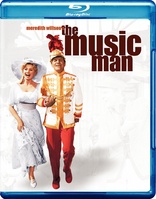
Movie rating
7.8 | / 10 |
Blu-ray rating
| Users | 5.0 | |
| Reviewer | 4.5 | |
| Overall | 4.5 |
Overview
The Music Man (1962)
A con man, masquerading as a music professor, convinces a small town to form a brass band as a way for him to pocket some dough. Although he knows nothing about music, somehow he is able to magically transform the townsfolk into acceptable performers.
Starring: Robert Preston, Shirley Jones, Buddy Hackett, Hermione Gingold, Paul FordDirector: Morton DaCosta
| Romance | 100% |
| Musical | 97% |
| Family | 85% |
| Comedy | 49% |
Specifications
Video
Video codec: VC-1
Video resolution: 1080p
Aspect ratio: 2.42:1
Original aspect ratio: 2.35:1
Audio
English: DTS-HD Master Audio 5.1
Spanish: Dolby Digital Mono
German: Dolby Digital 2.0 Mono
Subtitles
English, French, German, Portuguese, Spanish, Bulgarian, Greek, Norwegian, Romanian, Swedish
Discs
50GB Blu-ray Disc
Single disc (1 BD)
Playback
Region free
Review
Rating summary
| Movie | 4.5 | |
| Video | 4.5 | |
| Audio | 4.0 | |
| Extras | 2.0 | |
| Overall | 4.5 |
The Music Man Blu-ray Movie Review
One of the best ever Broadway to Hollywood adaptations arrives on Blu-ray.
Reviewed by Jeffrey Kauffman January 26, 2010Those of us who love classic Broadway musicals also love to pore over the sometimes weird but true trivia that dots both hit and flop shows. For instance, if one were to poll most music or theater critics about scores which changed the Broadway landscape, my hunch is the Bernstein-Sondheim opus West Side Story would place at or near the top of most people’s lists. And yet it is one of the ironies of Tony lore that a musical by an untested Broadway hand, and certainly a composer nowhere near Bernstein’s cachet despite having Oscar nominations and many other credits to his name, ended up winning the Best Musical Tony in 1957, beating out the Sharks and Jets in one fell swoop. It’s even more interesting, if perhaps indicative of the Eisenhower era, that this winning musical was an ode to the halcyon days of the early 20th century, weaving barbershop harmonies and an “old timey” feel to most of the score into a story rife with absolute hokum and silliness. This was not Shakespeare rethought by any stretch, and yet The Music Man not only won the Tony that year, it bested West Side Story’s original Broadway run by quite a large number of performances, had an Original Cast album that far outsold West Side Story’s, and went on to become one of the most popular of the early 1960s film musical adaptations of Broadway hits. (It’s worth noting of course that in the film world, West Side Story took home the gold and became a masterpiece of undisputed worth, while The Music Man is probably thought more of as a lightweight, albeit incredibly pleasant, entertainment that did boffo boxoffice). And yet if we examine The Music Man with a bit more critical eye, we begin to see that composer-lyricist-co-librettist Meredith Willson was actually rather subtly revolutionary in both his approach and technique, providing us with one of the most amiable anti-heroes to ever grace a Broadway tuner, and offering up a score with several rather ingenious innovations. Luckily, the film version of The Music Man retains virtually all of the original Broadway version’s flash and verve, and furthermore memorializes one of the all time great performances in Broadway musical history, Robert Preston as “Professor” Harold Hill, erstwhile band instrument and uniform traveling salesman.
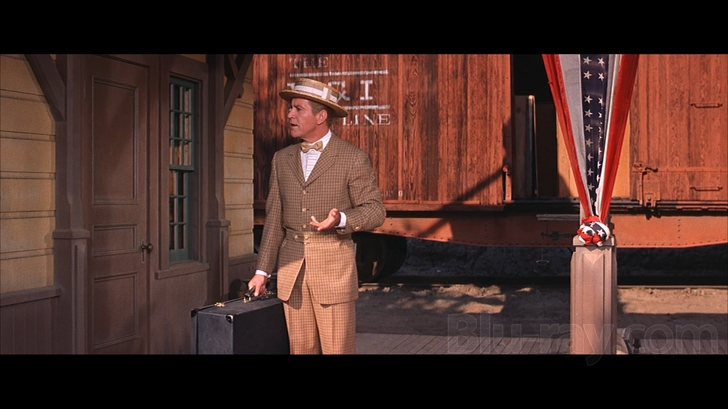
Robert Preston in his signature role, lovable conman "Professor" Harold Hill.
Despite having two Academy Award nominations for work on such films as Chaplin’s classic The Great Dictator, Meredith Willson was still largely an unknown quantity to Broadway producers and it took him close to a decade to get his idea of a hustling traveling salesman in a small Iowa town off the ground. It in fact took the prowess of Guys and Dolls’ Frank Loesser, who became Willson’s Broadway mentor and helped shepherd The Music Man to the boards (you’ll notice “Frank Productions” listed in the credits, an allusion to Loesser’s involvement). There was little if any buzz when The Music Man opened. Its score was by a relative unknown and its star, Robert Preston, had never really attained the ranks of first class stardom despite decades spent toiling as both a Paramount contract player and a freelancer in films both wonderful (Beau Geste) and, well, less so (My Outlaw Brother). And yet once the show opened, it quickly became the smash of that season. While it's easy to understand why—a nostalgic book and score, a wonderfully sly character in Hill matched by an equally facile interpretation by Preston, it’s really a little more interesting when you consider some of Willson’s innovations. Had a Broadway musical ever started with a rhythmically spoken sequence like the ingenious “Rock Island” number which gets The Music Man off to such a propulsive start? And had a musical ever exploited the patter song to such an extent as Willson did throughout The Music Man, in such famous numbers as “Trouble.” Add to that Willson’s unerring melodic genius in such standards as “Till There Was You” (a song the Beatles famously covered, reportedly providing the Willson family with more money in royalties than the show itself ever provided) and you start to have an inkling of Willson’s very particular genius. With some engaging quodlibets (I’ll let those of you curious enough about that word look it up) and such ingenious moments as the compositionally linked “Goodnight, My Someone” and “76 Trombones” (they’re basically the same song played at different tempi), Willson introduced one of the most surreptitiously innovative scores in 1950s musicals.
If MGM was the undisputed film musical studio of the 1940s and 1950s, by the early 1960s the luster was off of the lion’s output, and several other studios had picked up the torch, notably Warner Brothers. Producer Jack Warner was a famously hands on executive, and not always to the benefit of the film. He was infamous for wanting “movie stars” in his films, leading to the hotly debated casting choice of Audrey Hepburn in the place of Julie Andrews as My Fair Lady’s Eliza Doolittle in 1964, two years after Music Man (and in fact also in 1962 Warner chose Rosalind Russell instead of Ethel Merman for the film version of Gypsy). He indeed did not want a B-list actor like Preston starring in the film, despite the acclaim Preston had received on Broadway. Luckily wiser heads prevailed and the film is probably Preston’s most memorable cinematic role. With a subtly winking attitude, his Harold Hill is a fast talking son of a gun, but with Preston’s always amiable persona anchoring the performance, Hill is never smarmy or unlikable, really quite remarkable when one considers the rather unseemly exploits in which he’s engaged.
Also repeating his Broadway role, so to speak, is director Morton da Costa. Though da Costa only has three major films to his credit, one of the other two is the wonderful Auntie Mame, and along with The Music Man, proves that quality need not necessarily be tied to quantity. There’s nothing overtly flashy in da Costa’s approach, but that makes him perfect for this particular project. He opens up the stage version ever so slightly, with subtle moments like cuts to the train’s machinery during “Rock Island,” and some establishing shots as Hill arrives in River City, but otherwise, he plants his camera right where it should be and lets the actors do the rest. There is some overt theatricality in this film which may perplex modern viewers, notably the use of “blackouts” behind the actors before wipes or fades occur, but for those attuned to that sort of “stage magic,” it’s really not very disconcerting.
Replacing Broadway’s ineffable Barbara Cook is the lovely Shirley Jones, who makes a wonderfully stern and, later, befuddled and conflicted Marian the librarian. Jones is in perfect voice (though one aches to hear her perform “My White Knight,” the one song jettisoned from the original Broadway score), and her fiery temperament is neatly on display throughout the film. The Music Man also offers a host of fine and funny supporting bits, including the always marvelous Paul Ford and Hermione Gingold as River City’s mayor and his wife, as well as a surprisingly subdued Buddy Hackett as Hill’s sidekick (Hackett would go on to a legendary Broadway flop of his own in about a year and half, I Had a Ball). And of course, everyone’s favorite Mayberry child, Ron “Opie” Howard lisps his way endearingly through the role of Winthrop Paroo.
On the face of it, The Music Man is unabashedly old fashioned, not afraid to tug rather forcefully at nostalgic heartstrings. But underneath that shiny façade is a really interesting piece of writing, one which posits the rather remarkable moral that even a huckster is redeemable if he believes in himself strongly enough. Willson never saw lightning strike twice in his Broadway career. Each of his subsequent shows had diminishing returns, from the relatively successful The Unsinkable Molly Brown to the musical reworking of Miracle on 34th Street retitled Here’s Love (which recycled Willson’s holiday standard “It’s Beginning to Look A Lot Like Christmas”) to a flop which never made it to Broadway, 1491. But for one perfect moment, the stars were in alignment, and The Music Man was the wonderful result. Luckily, those stars remained more or less perfectly aligned for the superb film adaptation, one of the truest film versions to its Broadway source material. It may be old fashioned, but The Music Man will never go out of style.
The Music Man Blu-ray Movie, Video Quality 

There's mostly good news to report with Music Man's VC-1 encoded 1080p 2.4:1 transfer. Detail is incredibly sharp and for the most part the palette is bursting with exceptional color and nuance. There's a slight yellowish tint to the proceedings that is slightly off putting, rendering some of the flesh tones a sort of weird unnatural color. Reds and blues are especially impressive here, though those with a videophile's persnicketiness will notice that same yellow tint ever so slightly tweaking the spectrum. Grain looks very good throughout, and there are no blemishes or damage of any major import. There was one brief, and really rather bizarre, moment of artifacting which was quite noticeable. During the "Pickalittle" number (yet another great example of Willson's proficiency with patter), da Costa cuts to a black and white hen, and the line shimmer was really quite spectacular. In fact, I've decided to name this artifact after this unusual moment, and hereby dub it "The Magical Chicken Line Shimmer" effect.
The Music Man Blu-ray Movie, Audio Quality 
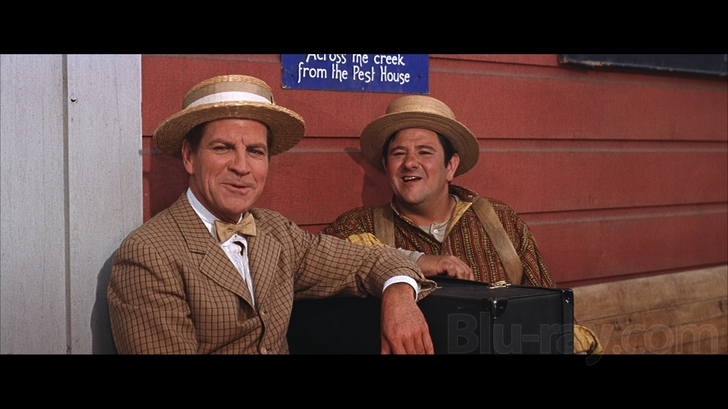
While I understand the desire to upgrade classic films' soundtracks to modern day standards, sometimes I wonder if just leaving well enough alone wouldn't be better. The Music Man received a Dolby Digital 5.1 upgrade for its most recent SD-DVD release, and that in turn has been upgraded to a DTS-HD MA 5.1 mix for this Blu-ray release. While only a curmudgeon would really complain about this in any detail, there are a couple of issues. First and foremost, there really isn't a whale of a lot of surround activity, which frankly is fine with me. The original film was released in stereo and never was hobbled by that technology. What's a bit more bothersome here is the boxiness of the stems themselves. Some of the looped dialogue has very noticeable differences in reverb and sound quality, and unfortunately the score sounds like it has a soft muslin sheath over the high and low ends, making things sound ever so slightly compressed. There are also some volume fluctuations throughout the film. There's nothing egregiously horrible about this mix, but I personally would have preferred the original stereo mix as an option, perhaps in an uncompressed format. On the other hand, if you toggle briefly to the Spanish mono mix, you'll quickly realize how robust the DTS 5.1 offering really is.
The Music Man Blu-ray Movie, Special Features and Extras 
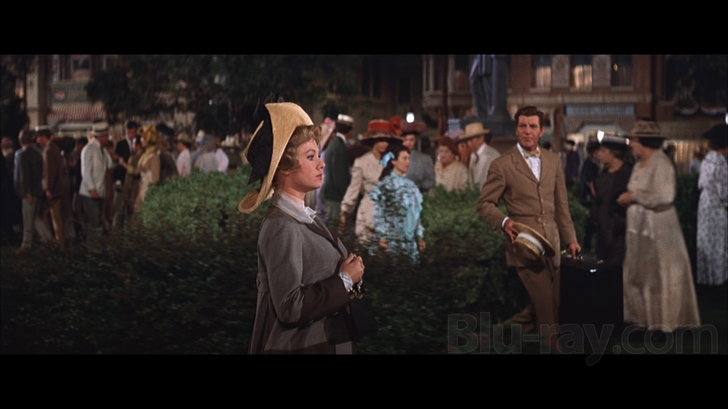
Most, but not all, of the supplements from the last SD-DVD Special Edition have been ported over to this Blu-ray release (in SD). The featurette "Right Here in River City" provides some nice background information and offers several interviews. There's also a separate introduction by Shirley Jones. Only the reissue trailer is included on the BD; neither the other trailers or the Production Notes from the SD-DVD have been ported over.
The Music Man Blu-ray Movie, Overall Score and Recommendation 
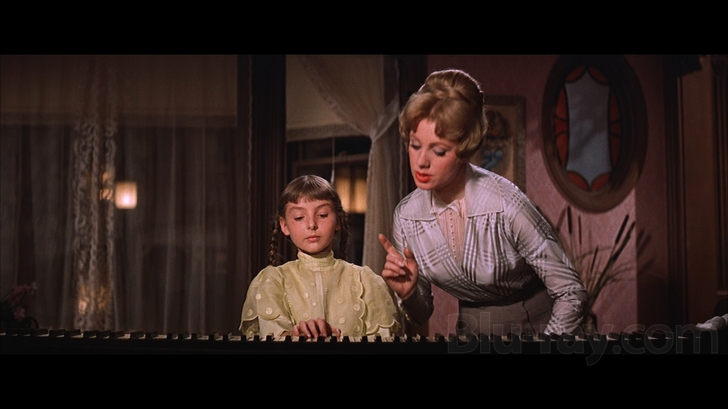
A near perfect example of transferring a Broadway hit to film, The Music Man memorializes Robert Preston's most engaging role and the wonderfully effective music and lyrics of Meredith Willson. You won't have Trouble with a capital T enjoying this splendid Blu-ray release.
Similar titles
Similar titles you might also like

Fiddler on the Roof
1971

White Christmas
Diamond Anniversary Edition
1954

The King and I
1956

Hello, Dolly!
Fox Studio Classics
1969

Seven Brides for Seven Brothers
Two-Disc Special Edition
1954

Fame
Extended Dance Edition
2009

My Fair Lady 4K
BD is Bonus Features
1964

Meet Me in St. Louis
1944

High School Musical: Remix
2006

Enchanted
2007

Camp Rock 2: The Final Jam
2010

High School Musical 3: Senior Year
2008

High School Musical 2
Extended Edition
2007

Babes in Toyland
1961

Camp Rock
Extended Rock Star Edition
2008

Mamma Mia! 4K
10th Anniversary Edition
2008

South Pacific
50th Anniversary Edition
1958

Guys and Dolls
Warner Archive Collection
1955

Kiss Me Kate 3D
1953

Mamma Mia! Here We Go Again
Sing-Along Edition
2018